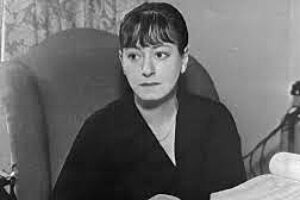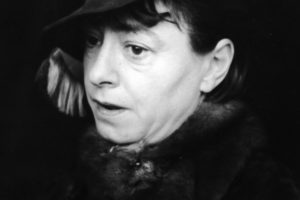For more than a year in preparation for writing my one-person musical about Dorothy Parker , You Might as Well Live, I read all of her published writings, every biography written about her and the Algonquin Round Table, and viewed every film for which she wrote the screenplay. I spent hours at the New York Public Library scanning through microfiche of old magazine articles that she wrote or that were written about her. I located poems that she deemed unworthy to include in her collections and were lost to the world (this was prior to 2010 when Dorothy Parker, The Complete Poems was published), a few of which I set to music.
In Marion Meade’s wonderful and comprehensive biography, Dorothy Parker: What Fresh Hell Is This? I learned that while she was still alive there were several stage adaptations of Mrs. Parker’s work being prepared for Broadway. Haila Stoddard, who had successfully done the same for James Thurber in A Thurber Carnival, was the most prominent. She put together several stories and verses for a revue called There Was Never More Fun Than a Man, a misquoting of the last line of her poem, “The Little Old Lady in Lavender Silk.” In the revue, Stoddard planned to incorporate two dozen unpublished songs by Vincent Youmans. Dorothy was ecstatic about the project, and especially about the use of Youman’s music, until she read the script.
She despised that the settings for some stories were changed, and according to Marion Meade, “She ‘hated’ the additional material they had written. The closing scene in which ‘Dorothy’ plays with her razor, nicks herself by mistake, then recites ‘you might as well live,’ did not appeal to her either.”
It was another project, however, that peaked my interest. Dorothy’s agent, Leah Salisbury, came to her with a script entitled, A Dorothy Parker Portfolio, based on her poems, stories, and writings from The New Yorker. Marcella Cisney, a director, who with her husband had a theater company at the University of Michigan, organized the material. She wanted to tryout the production at her theater in the 1967-1968 season, then bring it to Broadway. Cisney had similarly done a successful production based on Robert Frosts’s poems and letters. Marion Meade stated that A Dorothy Parker Portfolio “included Cole Porter’s music, sets based on the sketches of New Yorker artists such as Peter Arno and William Steig, and a cast starring Julie Harris and backed up by such versatile performers as Tom Ewell and Anne Jackson.
Dorothy was delighted with the script and particularly with the idea of Julie Harris portraying her. She was asked to attend rehearsals in Ann Arbor and offer her suggestions. Sadly, Dorothy died in 1967 and the production never occurred. I thought to myself, “If Dorothy liked this script, shouldn’t it be something I must study?” On a whim, I wrote a letter to Julie Harris, one of my very favorite actors, in care of her agent, asking whether she still had a copy of the script or remembered anything about how it was constructed. I never anticipated she would bother to answer me, but a few weeks later I received her hand-written response from Rome.
Dear Mr. Mathews—
Your letter was forwarded to me here in Italy where I am now working on a movie. I
remember something vague about a musical about Dorothy Parker but I don’t think
it was something I was going to do—there was a possibility of a play with music based
on the life of Gertrude Lawrence—but that didn’t materialize either. So, I’m afraid I can’t help you in finding the Dorothy Parker script.I will be doing a play this fall—in Florida at The Coconut Grove Playhouse, Nov. 4-
Dec. 3—a revival of “Ladies in Retirement” by Edward Percy and Reginald Denham
and perhaps if it has some success we may try to bring it to New York City.I wish you a good Fall Season.
Cordially,
Julie Harris
The film she was making was Passagio per il paradiso or Passage to Paradise, directed by Antonio Baiocco and produced by Massimo Cristaldi. Though her dateline reads Rimini, the letter was mailed from Rome. The story of the film is set in Tuscany but seems to have been shot in many locations, including France. Whether she simply forgot about the project or, perhaps, had not been actually engaged I could not learn.
Never was I able to locate any of these scripts, and therefore, I had to proceed to construct the book for my musical using my own instincts.
For a deeper look at the development of the Dorothy Parker musical, You Might as Well Live, see my autobiography, The Wrong Side of the Room: A Life in Music Theater by clicking here.






